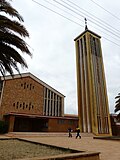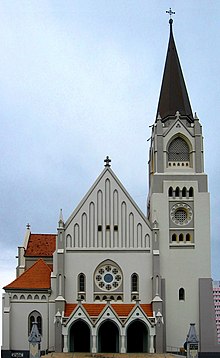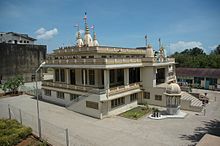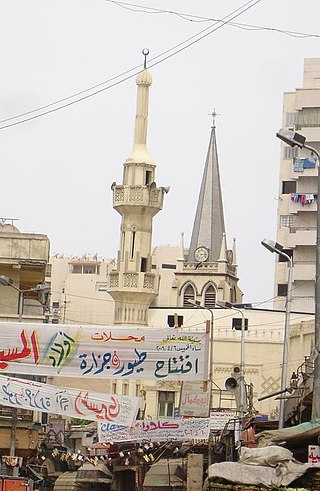
Religion in Egypt controls many aspects of social life and is endorsed by law. The state religion of Egypt is Islam, although estimates vary greatly in the absence of official statistics. Since the 2006 census religion has been excluded, and thus available statistics are estimates made by religious and non-governmental agencies. The country is majority Sunni Muslim, with the next largest religious group being Coptic Orthodox Christians. The exact numbers are subject to controversy, with Christians alleging that they have been systemically under-counted in existing censuses.
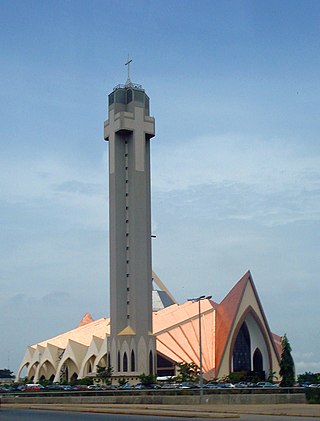
Religion in Nigeria is diverse. The country is home to some of the world's largest Christian and Muslim populations, simultaneously. Reliable recent statistics do not exist; however, Nigeria is divided roughly in half between Muslims, who live mostly in the northern region, and Christians, who live mostly in the southern region of the country. Indigenous religions, such as those native to the Igbo and Yoruba ethnicities, have been declining for decades and been replaced by Christianity or Islam. The Christian share of Nigeria's population is also now on the decline, due to a lower fertility rate relative to the Muslim population in the country.
Religion in Iraq dates back to Ancient Mesopotamia, particularly Sumer, Akkad, Assyria and Babylonia between circa 3500 BC and 400 AD, after which they largely gave way to Syriac Christianity and later to Islam.

Sunni Islam is the dominant religion in Jordan. Muslims make up about 97.2% of the country's population. A few of them are Shiites. Many Shia in Jordan are refugees from Syria, Lebanon, and Iraq.

Tanzania is a Christian majority nation, with Islam being the largest minority faith in the country. According to a 2020 estimate by Pew research center, Muslims represent 34.1% of the total population. The faith was introduced by merchants visiting the Swahili coast, as it became connected to a larger maritime trade network dominated by Muslims. This would lead to local conversions and assimilations of foreign Muslims, ultimately causing the eventual formation of several officially Muslim political entities in the region. However, according to the Association of Religion Data Archives (ARDA), 55.3% of the population is Christian, 31.5% is Muslim, 11.3% practices traditional faiths, while 1.9% of the population is non-religious or adheres to other faiths as of 2020. The ARDA estimates that most Tanzanian Muslims are Sunni, with a small Shia minority, as of 2020.

Christianity is a minority religion in Yemen. The Yemeni constitution mentions religious liberty. There are three churches in Aden.

The predominant religion in Kenya is Christianity, which is adhered to by an estimated 85.5% of the total population. Islam is the second largest religion in Kenya, practised by 10.9 percent of Kenyans. Other faiths practised in Kenya are Baháʼí, Buddhism, Hinduism and traditional religions.
According to various polls, the majority of Kazakhstan's citizens, primarily ethnic Kazakhs, identify as Sunni Muslims. In 2020, Shia Muslims made up 0.55% of the population.
Islam is the official religion in Kuwait, and the majority of the citizen population is Muslim.
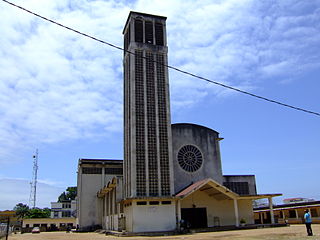
Christianity is the predominant religion in the Republic of the Congo, with Catholicism being its largest denomination.
The Constitution of Kuwait provides for religious freedom. The constitution of Kuwait provides for absolute freedom of belief and for freedom of religious practice. The constitution stated that Islam is the state religion and that Sharia is a source of legislation. In general, citizens were open and tolerant of other religious groups. Regional events contributed to increased sectarian tensions between Sunnis and Shia.

Christianity is the largest religion in Benin, with substantial populations of Muslims and adherents of traditional faiths. According to the most recent 2020 estimate, the population of Benin is 52.2% Christian, 24.6% Muslim, 17.9% traditionalist and 5.3% follows other faiths or has no religion.

Burkina Faso is a religiously diverse society, with Islam being the dominant religion. According to the latest 2019 census, 63.8% of the population adheres to Islam. Around 26.3% of the population practices Christianity, 9.0% follow Animism/Folk Religion, and that 0.9% are unaffiliated or follow other faiths.

Christianity is the majority religion in Cameroon, with significant minorities of the adherents of Islam and traditional faiths.

Christianity is the most widely professed religion in Tanzania, but in the island of Zanzibar most of the population is Muslim.
Qatar is an Islamic state with multi-religious minorities like most of the Persian Gulf countries with waves of migration over the last 30 years. The official state religion is Sunni Islam. The community is made up of Sunni and Shi’a Muslims, Christians, Hindus, and small groups of Buddhists and Baha’is. Muslims form 65.5% of the Qatari population, followed by Christians at 15.4%, Hindus at 14.2%, Buddhists at 3.3% and the rest 1.9% of the population follow other religions or are unaffiliated. Qatar is also home to numerous other religions mostly from the Middle East and Asia.
The main religion in Morocco is Sunni Islam, which is also the state religion of the country. Officially, 99% of the population are Muslim, and virtually all of those are Sunni. The second-largest religion in the country is Christianity, but most Christians in Morocco are foreigners. There is a community of the Baháʼí Faith. Only a fraction of the former number of Maghrebi Jews have remained in the country, many having moved to Israel.
This article documents the status of various religions in the limited-recognition state of Northern Cyprus. Turkish Cypriots administer approximately one-third of the island.

Sierra Leone is officially a secular state, although Islam and Christianity are the two main and dominant religions in the country. The constitution of Sierra Leone provides for freedom of religion and the Sierra Leone Government generally protects it. The Sierra Leone Government is constitutionally forbidden from establishing a state religion, though Muslim and Christian prayers are usually held in the country at the beginning of major political occasions, including presidential inauguration.
Freedom of religion in Tanzania refers to the extent to which people in Tanzania are freely able to practice their religious beliefs, taking into account both government policies and societal attitudes toward religious groups.



